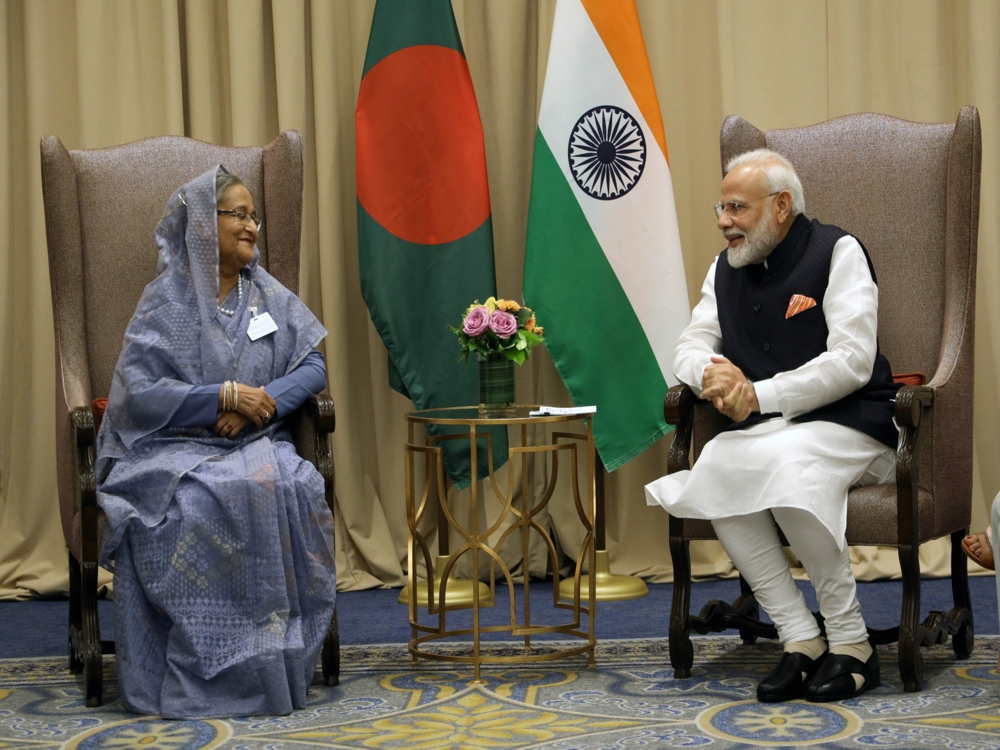India and Bangladesh are celebrating the 50th Anniversary of the 1971 Bangladesh Liberation War and the participation of such a huge contingent from a friendly neighbour in the Republic Day Parade was of special significance and has taken the relationship beyond a strategic partnership.
These units have the distinct honour of fighting and winning the 1971 Liberation War. And, the contingent from Bangladesh carries with them the legacy of legendary Muktijoddhas of Bangladesh and the Indian soldiers had valiantly fought side by side against the Pakistani army and secured victory. And, in that war for Liberation of Bangladesh, the blood of Mukti Bahini and Indian soldiers mingled with the soil and water of that country. The bond between the two is like no other. It is unparalleled in the annals of history.
To mark the golden jubilee of the 1971 Bangladesh Liberation War, the Indian government last year in December had kicked off the celebrations. The Indian Prime Minister Narendra Modi will be visiting Dhaka on March 26.
Indian External Affairs minister S. Jaishankar’s visit to Dhaka on March 4, is to pave the way for Modi’s visit, which comes just months after the two prime ministers held a virtual summit on December 17 last year, during which they had “directed the officials to expeditiously conclude the ongoing joint study on the prospects of entering into a bilateral Comprehensive Economic Partnership Agreement (CEPA). During the summit, Bangladesh Prime Minister Sheikh Hasina paid rich tributes to the Indian Armed forces and thanked India for the liberation of the country from Pakistan in 1971.
According to the Bangladeshi foreign ministry, Jaishankar is scheduled to meet Prime Minister Sheikh Hasina and his Bangladesh counterpart Dr AK Abdul Momen.
“There’re always some expectations centering all the visits,” said the Bangladesh State Minister for Foreign Affairs M Shahriar Alam, “the two ministers would be finalising the agenda of the meeting of the two prime ministers.”
According to the Bangladesh foreign ministry, during the visit, Modi and Sheikh Hasina likely to inaugurate the passenger train between Dhaka and New Jalpaiguri in India's West Bengal on March 26, as part of the celebrations of Bangladesh's golden jubilee of independence.
The rail connectivity between the two cities had been suspended since 1965.
All issues, including water, trade and connectivity, border killings, will be discussed during the meeting, the official said. A water secretary-level meeting between India and Bangladesh is likely to be held before Modi's visit.
"We would like to see the minister-level meeting of the Joint River Commission of India and Bangladesh," a foreign ministry official said, Ahead of the summit-level meeting, home secretaries of the two countries held a virtual meeting last week. Indian Commerce Secretary Anup Wadhawan is scheduled to hold a meeting with Bangladesh Commerce Secretary Md Zafar Uddin on March 7-8 in Dhaka.
The India and Bangladesh relationship is considered to be a copybook example of a neighbourly relationship. India considers Bangladesh a close partner in its neighbourhood first policy, its major outreach to the countries within its immediate vicinity. Given the commonalities and bonds they share, there will be a plethora of issues between the two countries like any other neighbours. The two countries have not allowed these issues to hijack the feelings of bonhomie and friendship and have not taken away from the emphasis on amicably resolving their differences.
That India remains top on Bangladesh PM’s agenda was evident from the fact that the Indian Foreign Secretary Harsh Vardhan Shringla was the first foreign visitor that she met in August last year since the outbreak of coronavirus four months ago. Indian foreign secretary Harsh Vardhan Shringla visited Bangladesh twice last year. The second visit in August came amid rising border tensions with China, which has committed $40 billion in investments in Bangladesh. China has been on an investment spree in Bangladesh in recent times. China is the biggest trading partner of Bangladesh, and also the largest destination of exports from Bangladesh. To deepen its trade ties with Bangladesh, China earlier this year declared zero duty on 97 percent of imports from Bangladesh. Additionally, China is the biggest arms supplier to Bangladesh.
What has worked for India during this period is the presence of the Awami League government. Sheikh Hasina’s party has a history of being favourable to Indian concerns unlike her rival Bangladesh Nationalist Party (BNP), during whose reign in the pre-2009 period, India saw support for the insurgency in the Northeast.
With India’s strategic rival China making inroads into India’s periphery, “it makes sense for India to extend a hand of friendship to close partner Bangladesh,” says Bangladesh journalist Moin Azad.
In January, India dispatched coronavirus vaccines to Bangladesh and other neighbouring countries, a day after launching supplies to "neighboring and key partner" nations to help them fight the pandemic when China too is pushing its COVID-19 response outreach in the region "Putting neighbors first, putting people first” policy.
"I thank Prime Minister Narendra Modi for sending the vaccines as a gift,” Bangladesh PM Sheikh Hasina thanked Modi.
The bonhomie between the two leaders was on virtual display in the last summit, when India Calls Bangladesh a significant pillar of Its Neighbourhood first policy, Bangladesh Calls India a true friend.




















